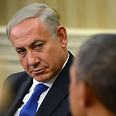
US hints Iran could get some sanctions relief
Undersecretary of State Wendy Sherman rules out imposing additional sanctions, as proposed by Netanyahu, in favor of possible sanctions relief in return for concrete steps from Iran. Netanyahu to NPR: I would consider meeting with Rohani
The United States held out the possibility on Thursday of giving Iran some short-term sanctions relief in return for concrete steps to slow uranium enrichment and shed light on its nuclear program.
Under Secretary of State Wendy Sherman, the lead US negotiator with Iran, also urged lawmakers to hold off imposing additional sanctions against Iran before October 15-16 when six major powers – Britain, China, France, Germany, Russia and the United States – will meet Iranian officials to negotiate over Tehran's nuclear program.
Related stories:
- US House passes Iran sanctions bill to slash oil exports
- Former top US officials: Lift Iran sanctions US Senate: Will back Israeli attack on Iran
The scheduled talks follow this year's election of Iranian President Hassan Rohani, a centrist who has made overtures to the West and spoke last week by telephone with US President Barack Obama in the highest-level contact between the two countries since 1979.
In testimony to Congress, Sherman held out the possibility of sanctions relief for Iran but made clear that the United States expects concrete actions from Tehran before this could happen. She said all US concerns about Iran's nuclear program must be addressed before the core sanctions could be removed.
"We will be looking for specific steps by Iran that address core issues, including but not limited to, the pace and scope of its enrichment program, the transparency of its overall nuclear program and stockpiles of enriched uranium," Sherman told the Senate Foreign Relations Committee.
"The Iranians in return will doubtless be seeking some relief from comprehensive international sanctions that are now in place," she added. "Only concrete ... and verifiable steps can offer a path to sanctions relief."
Democratic senator concerned
Senate Foreign Relations Committee Chairman Robert Menendez, a Democrat, voiced concern about early sanctions relief, saying this could undermine international support for the economic penalties that would then be very hard to restore.
Sherman said the fundamental, major sanctions - which she did not name - should remain in place until all US concerns about Iran's nuclear program are addressed, but suggested some openness to partial sanctions relief as negotiations proceed.
Because of the technical complexity of securing agreement on Iran's nuclear program, it would be useful to find a way to halt its progress to provide time for the negotiations, she said.
"What we are thinking through is, what is it that would give us some confidence today, would put some time on the clock, stop their nuclear program from moving forward, while we get to that comprehensive agreement that would allow the full sanctions relief they are looking for," Sherman said.
"There may be some elements that we can do initially if they take verifiable, concrete actions that will put time on the clock that are reversible, or in fact don't go to any of the key sanctions that have brought them to the table."
Together with its allies, the United States, which broke diplomatic ties with Iran in 1980 after the Islamic revolution, suspects that Iran is using its civilian nuclear program as a cover to develop atomic weapons.
Howard Berman, a Democrat and former chairman of the House of Representatives Foreign Relations Committee, suggested that sanctions should not be eased without Iranian action to rein in its nuclear program.
"Sanctions brought us to where we are and I think it would be a big mistake, and I think the administration knows it would be a big mistake, to get rid of or weaken those sanctions absent meaningful agreement with Iran," he said.
"If Iran were to make a decision to unilaterally suspend their enrichment program as a show of good faith I think it would allow things to move quickly from there," he added. "We should be trying to strive for a big deal, not nibbling around the edges."
Uranium enrichment can produce fuel for power plants or, if extended, fissile material for atomic bombs.
Republican Senator Mark Kirk criticized Sherman for suggesting that the Senate should hold off on additional sanctions against Iran before the talks.
"The State Department should not aid and abet a European appeasement policy by pressuring the Senate to delay sanctions while the world's leading sponsor of terrorism races toward a nuclear weapons capability," he said, urging "maximum economic pressure on Iran to give diplomacy a chance to succeed."
PM: I would consider meeting Rohani
Meanwhile, Prime Minister Benjamin Netanyahu continued his "media blitz" on Thursday and held an interview with America's NPR. Asked if he would meet Iranian President Hassan Rohani he said: " I don't care about the meeting. I mean, I don't have a problem with the diplomatic process.
" I haven't been offered, and if I'm offered, I'll consider it. But it's not an issue because if I meet with these people, I would stick this question in their face: Are you prepared to dismantle your program completely? Because you can't stay with the enrichment. They say, we have a right to civilian nuclear energy."
Yitzhak Benhorin contributed to this report
- Receive Ynetnews updates directly to your desktop










